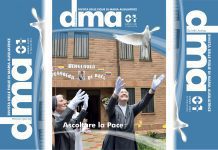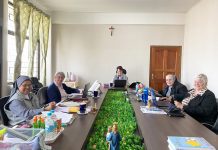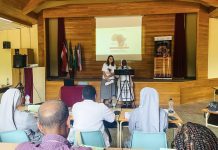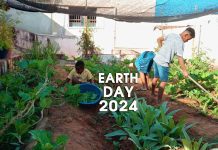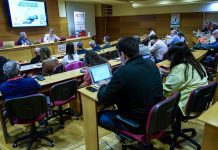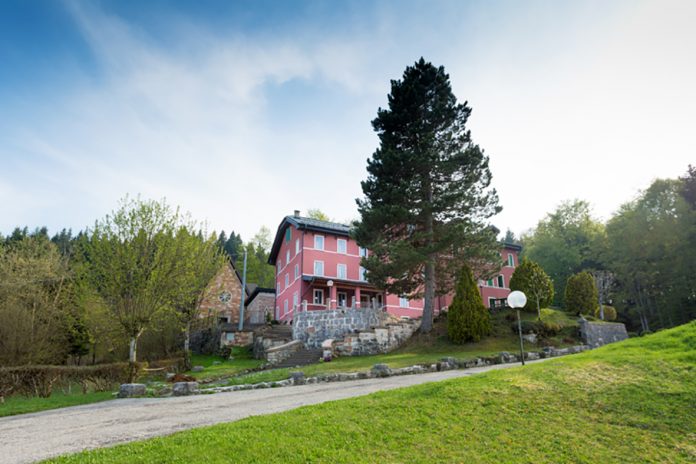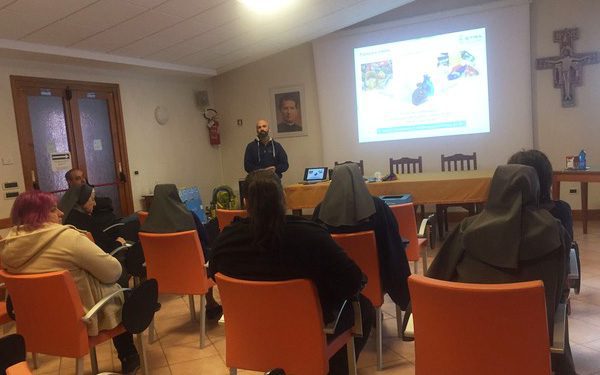Cesuna (Italy). On 2 December 2022, the Daughters of Mary Help of Christians of Mary Help of Christians Community, challenged by the Chapter resolution which calls us to listen to the cry of the earth and to make courageous choices with a view to integral ecology, experienced an ecological formation encounter with the collaborators of Villa Tabor Spirituality Center of Cesuna, in the province of Vicenza, of St. Mary D. Mazzarello Province (ITV).
Sr. Anna Maria Zagonel, Director of the Center, explains the choice of the theme thus, “We live in the Asiago plateau, at an altitude of 1040 meters, immersed in a bright landscape that amazes and regenerates. However even here, we see and hear the cry of the earth that challenges us: trees felled by the Vaia storm (which broke out in the Dolomites between October and November 2018), fir trees dried up by the bark beetle (a wood parasitic insect), woods and paths often strewn with waste…
Our structure welcomes guests of different origins, ages, and requests: groups of families, courses of Spiritual Exercises, formation days, relaxing holidays, youth groups. We asked ourselves the question: can the waste that we and our guests produce be reduced? Can we differentiate them better, so that we can recycle more of them? Could we also become promoters of good practices to collaborate in the recovery of the earth?”.
The Community therefore contacted ETRA (Energia Territorio Risorse Ambientali), a fully publicly owned multi-utility company which carries out a series of services concerning the management of the integrated water service and waste management in the Brenta river basin, from the Asiago plateau to the Colli Euganean.
On 2 December, Dr. Alessio Piva of ETRA, through videos, data, and presentations of some recycling chains, provided a series of practical indications, inviting the participants in formation to place themselves with attention and care in separate waste collections, and become promoters of good ecological practices.
The next step was to “go from knowledge to facts”. “Together we decided to monitor our behavior, review the tools and methods in place and, consequently, decide on the appropriate corrections to our habits, also using suitable receptacles, partly new and beautiful. By doing this, we are convinced that we can contribute to the objective of reducing the volume of waste to be disposed of, above all by collaborating in the recycling of the same to transform it into a resource for the good of many and to take care of the beauty of creation”, explains Sr. Anna Maria.
The care of ecological formation is essential to live and accompany others to fully live the experience at Villa Tabor, a space surrounded by greenery in which to rediscover and recover inner energies.
Entrusted to the FMA in 1943, Villa Tabor was in fact born for the care of the spirituality of groups of young people, accompanied to discover and rediscover the beauty of life in contact with nature.
Today, as a holiday House, it hosts up to 70 people and is open to everyone: small groups and families, young people, men and women religious, making available to guests the interior spaces for working in large and small groups, a church dedicated to the Transfiguration of Jesus on Tabor, and the private park of about 1300 square meters which completely surrounds the property.
There are various activities that can find space at Villa Tabor, such as spiritual exercises, retreats, the planning of ecclesiastical bodies and movements. … Depending on the needs, it offers the possibility of: experiencing a time of rest and vacation; sharing some moments of prayer and service with the FMA community; adhere to educational experiences that the house offers; adapt the offer of educational, formative, spiritual, and cultural proposals for formal and informal groups.
“Living the vocation of being custodians of God’s work is an essential part of a virtuous existence; it does not constitute something optional or even a secondary aspect of the Christian experience” (Laudato Si’, 271).



